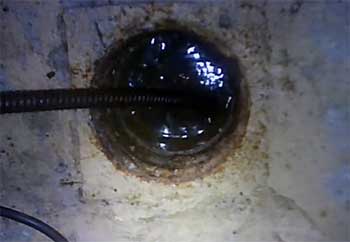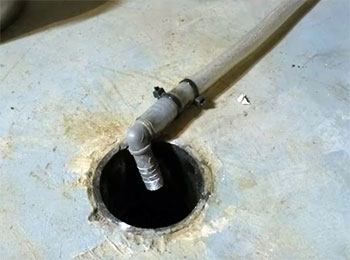Floor drain clogged with rust is such a common problem. People who live in old houses face this problem more often. Clogging not only blocks the drain but also causes some other problems like bad odor, slow drainage, etc.
There are several reasons behind this problem. In this article, we will discuss thoroughly the probable reasons and suitable solutions for the clogged drain with rust.
Reasons For Rust Clogged Floor Drain

Several reasons are responsible for this problem. Let’s find out one by one:
- Not Maintaining the Drain Properly
One of the main reasons for the floor drain being clogged with rust is not maintaining the drain in a proper way. We often let small pieces of the trash get inside the drain. But this can lead to rust. Let me explain why.
When trash or any other build-up sticks inside the drain, it gets hard after a while. Over time, it transforms into rust and blocks your pipe. And that’s why you may notice that water is pooling on your shower floor!
So, we can say that not cleaning the build-up and other trash regularly is one of the culprits for clogging your floor drain.
- Age and Wear
Over time, metal drain pipes, fittings, and grates will naturally corrode from exposure to moisture and chemicals like cleaning products. As the metal oxidizes, rust flakes off and collects in the drain. Older drain systems are more susceptible.
- Infrequent Use
Floor drains in basements, garages, patios, and other areas that don’t get used daily are prone to rust. When water sits for long periods, it corrodes the metal and leaves behind rust sediments.
- Hard Water
Mineral deposits in hard water environments can accelerate rust formation. Calcium, magnesium and iron particles bind to pipes and drains, creating a scaly rust residue when they interact with moisture and oxygen.
- Chemical Exposure
Harsh cleaners like bleach or drain openers that contain sulfuric acid can degrade pipes and loosen rust particles over time. Grease and oil buildup also attracts rust.
- Cracked Pipes
If underground drain pipes have cracks or damage, soil and sand can seep in. This abrasive sediment collects in the drain and mixes with moisture to create a thick, rusty sludge.
- Hair Build-up
A clogged floor drain in the bathroom is often caused by hair build-up and eventually, it causes rust in the drain pipe. The hair build-up holds the moisture for a long time, and the moisture causes rust.
- Corrosion
The main reason for clogging with rust is corrosion. Without corrosion, the rust cannot be built up. General corrosion happens when the majority or all of the atoms on a metal surface are oxidized, causing the surface to corrode completely.
Most metals are easily oxidized, and they frequently lose electrons to oxygen (among other elements) in the air or in water.
Oxygen joins with the metal to produce an oxide as it is reduced (gains electrons). And that is how the rust is formed.
- Only Depending on DIY Cleaning Method
This might be one of the reasons that your floor drain is clogged with rust. Many people depend on only DIY methods for cleaning their drains.
Some of them use natural drain cleaners such as baking soda, vinegar, lemon juice, etc. But you have to know that these methods can not completely clean your drain.
These can’t wash all the build-up away. Eventually, those build-ups get hard and cause rust. So, be careful of that.
- Roots
This can be another reason that your floor drain is clogged with rust. Older homes are more likely to have tree roots around the drain pipes.
Tree roots will enter your drain line if there are any gaps or weak spots since they tend to grow towards any moisture. These roots hold moisture and cause clogging with rust.
Signs of a Rust-Clogged Floor Drain
How can you tell if your clogged drain is caused by rust buildup? Here are some telltale signs:
- Slow-draining water that bubbles back up, taking much longer to recede. This happens as rust sediment narrows the pipe diameter.
- Gurgling sounds or foul sewer gas odors coming from the drain. Rust sludge traps smelly gas.
- Orange-brown staining around the drain grate. Rust flakes off and leaves behind stains.
- Little to no water drains out. Eventually, thick rust will completely block water flow.
- Musty metallic smell coming from the drain. This odor occurs as rust corrodes the metal pipes.
If you notice these warning signs, it’s time to take action and un-clog the blockage before plumbing headaches arise!
How To Solve Your Rusted Floor Drain Problem?
Now we know all the probable reasons for the floor drain being clogged with rust. It’s time to dive into the solutions for this problem:
- Keep Your Floor Drain Clean

Keeping your floor drain dry and clean can solve 70% of the problem. There will be no build-up in the floor drain if you clean the drain regularly.
As a result, the rust will not be formed easily, and your drain will be clogs-free.
A good strainer can make your task easier. This will catch hair, small soap, small pieces of plastics, or any other potential clogging material from going into the pipe.
Do not forget to clean the strainer once or twice a week. This method will solve your problem of drain pipe clogged with rust without any hassle.
- Chemical Drain Cleaners
Chemical drain cleaners can make your job super easy. It can remove all the clogs with minimum effort. These cleaners work quickly because they include a lot of lye and sulfuric acid.
All chemical drain cleaners come with instructions and warning labels, and it is crucial to follow them all because each one has a unique method for clearing out stubborn blockages quickly.
Don’t forget to clean all the remaining chemicals from your drain by running enough water down it. Drano, Pure Lye, CLR (Calcium Lime Rust remover), Liquid- Plumr, etc. are some powerful chemical drain cleaners that will clean your drains quickly and also, will remove the rust.
- Use Hydrogen Peroxide
A widely popular household item called hydrogen peroxide can be used to clean and get rid of minor rust spots and clogs. Apply hydrogen peroxide to the drain pipe, then clean it off with an old toothbrush.
The rust will be gone, and you will have a fresh floor drain pipe.
- Plunger
Place a tight-sealing plunger over the drain grate to create suction. Work it up and down vigorously about 20 times. This pressure can help dislodge the clog. Repeat if needed.
- Drain Snake
Use a manual crank or powered electric auger snake to reach deeper clogs. Slowly twist the metal coil to latch onto debris. Retract and remove gunk. Keep repeating runs until water flows freely.
- Pumice Stones
To remove rust from the floor drain, you can also use pumice stones. You can just dampen the stone and start washing the rust off. Most of the rust will be cleaned if you exert enough pressure.
You should be able to make a paste out of the damp stone, which will help to remove the extra rust stain on the area.
- Install a Water Softener
Consider adding a water softener to safeguard your drain pipes.. In homes where the hard water is causing problems, a softener can be an excellent solution.
Hard water is one of the main culprits for your drain pipe. The water softener removes the minerals from the water and keeps the water fresh.
- Salt and Lemon
Those who are looking for a DIY method, this will be a perfect solution for you. All you need is salt and lemon juice for this. Apply a paste made of salt and freshly squeezed lemon juice to the rusted area.
Once applied, give the paste several hours to settle on the rust. After that, use a brush or a microfiber cloth to remove the rust before cleaning with water.
But remember, it will work only on a thin layer of rust. The DIY method won’t work on the rust which is really hard or rigid.
Lastly, I want you to watch this video carefully!
Preventing Future Rust-Clogged Drains
Prevention is the best medicine when it comes to avoiding recurrent rusty drain clogs. Here are some smart tips:

- Use drain strainers to catch hair and debris before it washes down.
- Pour 1 cup baking soda and 1 cup vinegar down drains monthly to clean and inhibit rust.
- Have metal drain pipes replaced with PVC if they are old and corroded.
- Use a water softener system or filter if you have hard water. This reduces scale buildup.
- Avoid pouring grease down drains. Wipe up spills instead.
- Stop using harsh drain cleaners. Try eco-friendly enzyme cleaner alternatives.
- Run water through floor drains weekly if they are not used often. Stagnant water promotes rust.
- Address any cracks or leaks in underground pipes that allow sediment inside.
With vigilant maintenance, you can keep rust from returning and clogging your drains. Contact a plumber if problems persist despite preventive efforts.
Frequently Asked Questions (FAQs)
There are several ways to remove dust from the drain. One of the easiest methods is to use chemical cleaners to remove rust from a floor drain. Different types of chemical cleaners are available in the market, you can pick your preferred one according to the total area and strength of the rust.
You can use vinegar to remove rust from your basement floor drain. Pour the vinegar to the drain and wait for 15 minutes. Use a toothbrush or sponge to wipe off the rust. Finally, clean the drain with lots of water.
Yes. Rust is the common reason for drain clogging. Rust interrupts the normal flow of water and prevents the dirt from going away with water. And that’s how the rust clog drains.
Yes. Drano is one of the most powerful products to dissolve rust. The best part is that it won’t harm your drain pipe while dissolving the rust. This is a reliable chemical cleaner to dissolve the rust and remove them from the drain pipes.
White vinegar or diluted citric acid work well to dissolve rust particles. Pour 1 cup down and let sit for 15 minutes before flushing with hot water. Lemon juice also contains citric acid. Just avoid using acidic solutions on chrome or stainless steel pipes.
Use a wire hanger, plunger, or auger snake to break through debris. Flush with boiling water. Alternatively, seal the drain and use a wet/dry shop vac to create strong suction that pulls up clogs. Finish by flushing with a mixture of baking soda and vinegar.
Final Words
A floor drain clogged with rust can be a headache if you don’t know how to remove the rust and unclog the drain. However, you can easily get rid of this problem by following the methods we have discussed above.
But if you think that your drain is completely clogged, you should definitely call a plumber and get a professional drain cleaning.
You should also follow a few techniques, such as keeping the areas dry, using the best drainage pipes, etc., to prevent rust from occurring.
